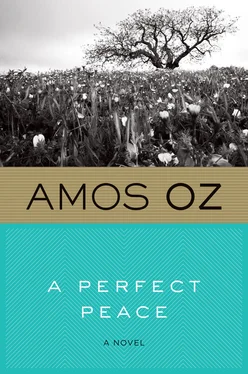"And I," said Yonatan, "have won."
"There now," said Rimona. "The kettle's boiling again."
They drank more coffee and Azariah demolished another plate of pastry. When it was all gone, he took his guitar out of its battered case, moved away from his hosts, and sat down on a footstool near the kitchen door. Tia went with him, sniffing at his shoes. At first he picked out two or three simple popular tunes, sometimes humming softly along, but then he started playing a melancholy melody that neither of them knew.
"That was sad," said Rimona.
Azariah flinched. "You didn't like it? I can play all kinds of things. Just tell me what."
"It was beautiful," said Rimona.
Thoughtfully, Yonatan gathered the survivors from the board and arranged them in two rows, black and white, on the table.
"That was just fine," he said. "I don't know much about music, but I could see that you played that piece very carefully, as if you were worried you might get carried away and snap the strings. It made me think of how quickly you figured out what was wrong with the Caterpillar. If you'd like, I'll say a word about you to Srulik. He's in charge of music around here. For now, though, we'd better think of going to the dining hall for supper."
"Comrade Yolek," said Azariah, "mistook me for that Srulik yesterday. I myself, of course, do not believe in pure coincidence. Everything happens for a reason."
Before he left, Rimona gave Azariah Gitlin the electric kettle, a bag of sugar, a can of coffee, and yet more pastry. Yonatan rummaged through drawers and found a new light bulb for Azariah's room. One look at it, though, was enough to establish that it wouldn't be any brighter than the old one.
Over supper Azariah once again began to lecture his hosts, which struck Yonatan as tiresome. He went on chewing in silence on a piece of bread while helping himself generously to the salad and a double portion of omelet. Rimona, however, listened attentively to every word. At one point, when she asked Azariah what he would do to stave off political disaster, it so went to his head that he forgot all about the vegetables she had just put on his plate. He began rehearsing an ingenious plan for engineering a big-power confrontation that would enable little Israel to slip safely away and even come out ahead.
During this recital, Etan R. stopped by their table and interrupted Azariah with a grin: "Well, well, I see you didn't get lost after all. I live in the last room by the swimming pool. If by any chance you find any justice around here, come tell me about it right away so we can nip it in the bud."
From across the hall, Yonatan's mother Hava waved hello. Little Shimon, mug in hand, came over to ask Yonatan to lend him the newcomer for a few days in the hope he might work some miracles in the sheep pen as well.
Before they parted and went their separate ways, Rimona invited Azariah, touching his elbow, to come again some evening to chat and play chess and to bring his guitar if he felt like it.
Once back in the barber's shack, Azariah thought of the picture that hung in Yonatan and Rimona's room, the dark, thirsty bird atop the brick wall, the surrounding murk, the diagnoal shaft of sunlight, and the flaming wound that shaft inflicted on a single brick in a lower corner. So I'm invited back to chat and play music and chess. She'll have to make up to me a lot more than that if she expects to be forgiven. Her baby girl died and now she doesn't even have that.
"He's a loudmouth, a cheat, a brown-nose, and a bullshitter," said Yonatan to Rimona, "and yet you can't help kind of liking him. I'm going over to talk to Udi about the fruit shipments. I won't be late."
A thick night hung over the kibbutz. The air was cold and raw, and the biting wind did not flag. It's a funny thing, thought Rimona, smiling in the darkness.
In the days that followed, Azariah Gitlin made still more repairs. His energy knew no bounds. He greased, tuned, and tightened; took apart and reassembled; changed dying batteries and readjusted fanbelts; washed, waxed, and polished. He undertook to reorganize the shed by arranging the work tools in a logical order, putting up a broad wooden board on which to hang screwdrivers, wrenches, and pliers according to size, labeling all the drawers and shelves, and scrubbing the filthy concrete floor with detergents. He persuaded Yonatan to climb up to the rafters to get rid of the spider webs and birds' nests underneath the tin roof. He catalogued the spare parts and took a full inventory. As a crowning touch, he clipped a large, colored photograph of the rotund Minister of Welfare from an illustrated weekly magazine and taped it to the wall. Every day from now on, plump-cheeked and jovial, Dr. Yosef Burg would look down on the men at work, imparting a self-satisfied bliss.
Azariah arrived early each morning in dark blue work clothes that were slightly too big on him and stood waiting for Yonatan to appear with the keys to the shed. Invariably, Yonatan would be sleepy, grouchy, and often teary-eyed, and Azariah would try to cheer him up with a story about one of the old grandmasters, giants like Alekhine, Capablanca, and Lasker, compared to whom such current aces as Botvinnik and Petrosian were, so to speak, abject nonentities. To be sure, his entire fund of knowledge on the subject came from the chess journals that Yonatan had lent him and that he studied exhaustively while lying in bed.
One evening Azariah made his way to Yolek and Hava's and harangued them from eight o'clock until nearly midnight on the cyclic nature of Jewish destiny, its recurrent pattern of destruction and redemption, repeatedly referring not only to his own ideas but to a number of articles by Yolek Lifshitz in issues of the Labor Party monthly that he had come across in the recreation hall. He also expounded on the place of the creative individual in kibbutz society. Though his knowledge was as limited as his fervor was unbounded, he did manage now and then to come up with an original enough thought to make Yolek remark after he was gone, "Take it from me, Hava. I'm rarely wrong about these things. That boy has a real spark in him. If he's lucky enough to find a good girl, something may come of him yet."
"He's very strange and very sad," replied Hava. "If you ask me, this will come to no good end. You and your big discoveries!"
Azariah managed to gamble away his last two packs of American cigarettes before he had a chance to give them as gifts to new-found friends. One night he landed in the last room adjoining the swimming pool, reintroduced himself to Etan R., met the two girls who had been living with Etan since the onset of winter, and began to talk about citrus fruit. When he claimed that a grapefruit was simply a cross between an orange and a lemon, Etan not only objected but challenged him to a bet. Azariah immediately appointed the two girls as judges, asked for their verdict, and deferred without protest to their lack of support, laying his two packs of cigarettes on the table. Before leaving, he promised to bring the relevant volume of the Encyclopaedia Britannica, for he intended to prove that there was a fruit, perhaps the tangerine, that was half a lemon and half an orange after all.
From Etan R.'s he went to pay a call on Srulik, the music man, for whom he played his guitar for a good ten minutes, smiling all the while but blinking frantically like a cat that wants to have its ears scratched. Indeed, the cat succeeded, for Srulik decided to let him try out for the kibbutz chamber quintet.
On Thursday he visited Yonatan and Rimona again to return part of the coffee and sugar they had given him. After all, he was now getting supplies from the kibbutz commissary in accordance with Secretary Yolek's instructions. He presented Rimona with a wicker shade he had made for the lamp, pointing out that it was only a token gift.
Читать дальше












